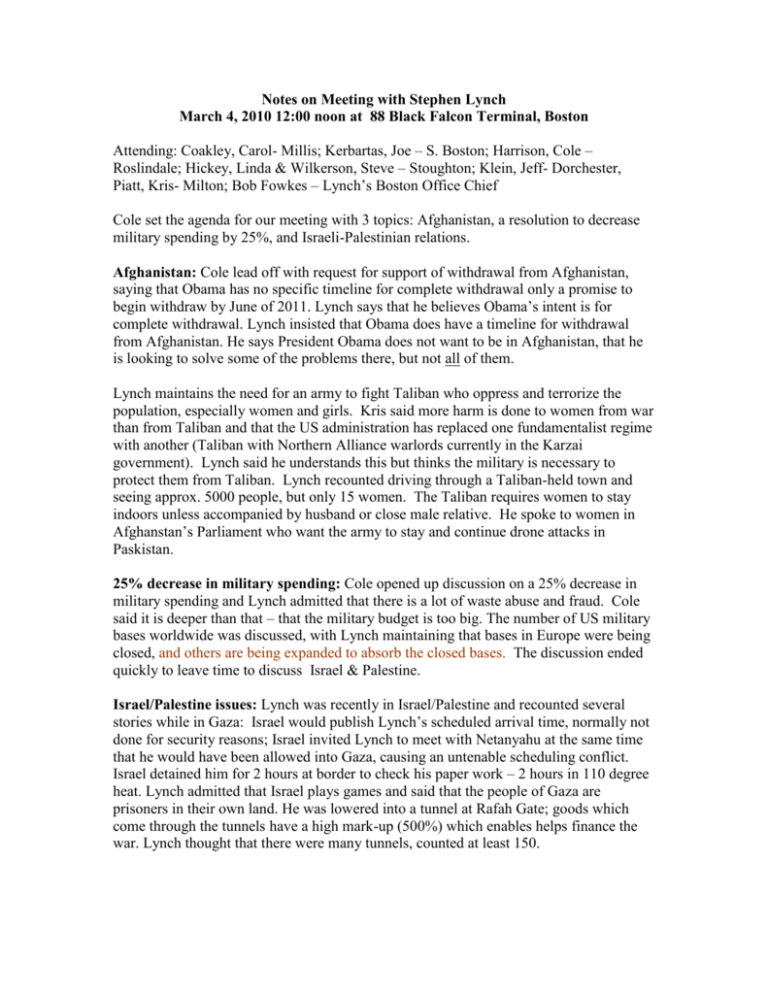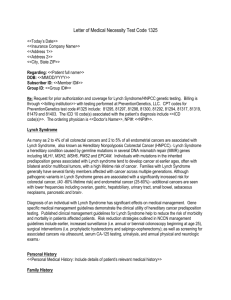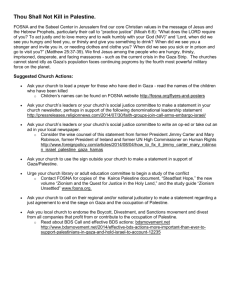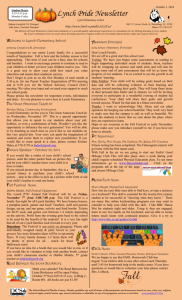Notes on Meeting with Stephen Lynch March 4 2010
advertisement

Notes on Meeting with Stephen Lynch March 4, 2010 12:00 noon at 88 Black Falcon Terminal, Boston Attending: Coakley, Carol- Millis; Kerbartas, Joe – S. Boston; Harrison, Cole – Roslindale; Hickey, Linda & Wilkerson, Steve – Stoughton; Klein, Jeff- Dorchester, Piatt, Kris- Milton; Bob Fowkes – Lynch’s Boston Office Chief Cole set the agenda for our meeting with 3 topics: Afghanistan, a resolution to decrease military spending by 25%, and Israeli-Palestinian relations. Afghanistan: Cole lead off with request for support of withdrawal from Afghanistan, saying that Obama has no specific timeline for complete withdrawal only a promise to begin withdraw by June of 2011. Lynch says that he believes Obama’s intent is for complete withdrawal. Lynch insisted that Obama does have a timeline for withdrawal from Afghanistan. He says President Obama does not want to be in Afghanistan, that he is looking to solve some of the problems there, but not all of them. Lynch maintains the need for an army to fight Taliban who oppress and terrorize the population, especially women and girls. Kris said more harm is done to women from war than from Taliban and that the US administration has replaced one fundamentalist regime with another (Taliban with Northern Alliance warlords currently in the Karzai government). Lynch said he understands this but thinks the military is necessary to protect them from Taliban. Lynch recounted driving through a Taliban-held town and seeing approx. 5000 people, but only 15 women. The Taliban requires women to stay indoors unless accompanied by husband or close male relative. He spoke to women in Afghanstan’s Parliament who want the army to stay and continue drone attacks in Paskistan. 25% decrease in military spending: Cole opened up discussion on a 25% decrease in military spending and Lynch admitted that there is a lot of waste abuse and fraud. Cole said it is deeper than that – that the military budget is too big. The number of US military bases worldwide was discussed, with Lynch maintaining that bases in Europe were being closed, and others are being expanded to absorb the closed bases. The discussion ended quickly to leave time to discuss Israel & Palestine. Israel/Palestine issues: Lynch was recently in Israel/Palestine and recounted several stories while in Gaza: Israel would publish Lynch’s scheduled arrival time, normally not done for security reasons; Israel invited Lynch to meet with Netanyahu at the same time that he would have been allowed into Gaza, causing an untenable scheduling conflict. Israel detained him for 2 hours at border to check his paper work – 2 hours in 110 degree heat. Lynch admitted that Israel plays games and said that the people of Gaza are prisoners in their own land. He was lowered into a tunnel at Rafah Gate; goods which come through the tunnels have a high mark-up (500%) which enables helps finance the war. Lynch thought that there were many tunnels, counted at least 150. Lynch believes Israel should end “the blockade of Gaza”. Before the 2nd intifada, 60,000 Palestinians were working in Israel and there were multiple points of contact between Israeli’s and Palestinians. They knew about eachother’s bar mitvahs and birthdays etc. Now that contact has been blocked the new generations have demonized each other, making this is a very volatile time. Rocket attacks have stopped; there have been no rocket attacks for 8 weeks but Israel has not responded with significant changes in their blockade of Gaza. Lynch feels that Israeli officials should be rewarding Hamas for the cease fire. Materials for repairs to the damage Israel inflicted on Gaza in December, 2009 are allowed in now only in a trickle. Lynch thinks we should rebuild American University as a counterbalance to radical Islam – Israeli bombs destroyed it, claiming that small arms fire was coming from it. Lynch said "Gaza is a prison.... Israel is generating so much anger and hostility". Lynch also expressed personal sympathy for the plight of Palestinians saying that if he was denied the right to accompany his daughter for medical treatment, “I would want to kill somebody too.” Lynch met on Israel/Palestine issues with V.P. Joe Biden, James Jones, also Reps. Keith Ellison (D-MN), Brian Baird (D-WA), and Donna Edwards (D-MD). The substance was not clear but some kind of new push on I/P policy. Lynch was critical of Congresswoman Ileana Ros-Lehtin (R-FL) resolution condemning UNWRA workers in Gaza, which already has 100 signatures. He spoke about SUV’s held up at TelAviv airport (Tierney’s and his committee got them release after threatening the State Department with hearings) Lynch admitted that the State Department could be doing more. We discussed that Israel gets $3 billion a year from the US and that the US taxpayers are underwriting Israel’s apartheid policies. When asked about Kucinich's concurrent resolution, he rolled his eyes and appeared to dismiss any conversation about him or his resolution to bring troops home this year. He said the US now has 2 million soldiers that qualify for VA services. Lynch said "The VA Hospitals were being filled up by soldiers who were in the war zones many times!" In summary, Kris Piatt connected the 3 agenda points (Afghanistan, 25% reduction in military spending, and Israel/Palestine relations) by noting that it is military intervention that makes people retrench to polarizing positions and fundamentalism. We urged Rep. Lynch to speak out on Israel/Palestine issues and to vote against any up-coming military supplemental budgets. Lynch gave us his DC staff contacts: Bruce Fernandez - Legislative Director Mariana Osorio - Foreign Policy Kevin Ryan - Chief of Staff Conclusion: We urged Lynch to support D. Kucinich's HR 248 resolution to debate the continuation of the war in Afghanistan. Support Congressman Barney Franks initiative from Feb 2, 2010 to “over the next ten years … save substantial amounts of money – 1 trillion (dollars) or more of currently proposed expenditures – b reassuming ( did you mean “by re assessing” some of the fundamental premises of American military policy. Some of those are based on Cold War assumptions … which were designed in an era of confrontation with the Soviet Union.....Our range of commitments must be scaled back.” We also urged Lynch to support initiatives which will bring a conclusion to the Palestinian-Israeli conflict, ie. An end to continued construction of Israeli settlements in the West Bank and East Jerusalem.






